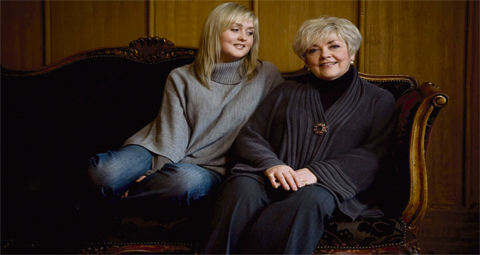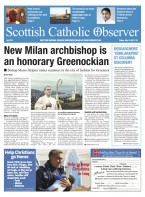January 15 | ![]() 0 COMMENTS
0 COMMENTS ![]() print
print

Life at the heart of new initiatives
— SPUC SCOTLAND shares with us some of its diverse and innovative projects, which aim to stress the importance of protecting human life and highlight the damage that abortion can do to women
The heart is a powerful symbol across societies and cultures. The heart signifies all that is best in a person and we see it as the centre of the emotions. In medical dramas the beating heart trace signifies how well the patient is doing. The flat-line tone indicates the end of life, in contrast to the reassuring beep that indicates continuing life.
It is not surprising therefore that when SPUC activists explain the facts about human development to people on the streets, or in classrooms, a fact which fascinates so many is that the heart begins to beat so early in human development. From as early as 18 days from conception, the rudimentary heart is beating and it will continue throughout a person’s life. At conception a new human life comes in to existence. It is genetically complete, unique and alive. We each had a first day of life in the same way and you were you from that very first instant when so many of our physical traits were determined. So the beating heart does not signal the start of life, but it is nonetheless a powerful testimony to the continuity of life.
For that reason the heart was chosen as the symbol for a new initiative that SPUC launched with a range of other organisations to promote the value of human life. Don’t Stop a Beating Heart is based around a core set of values, which we believe can be supported by all people of good will. These values build on human rights laws as they have been written—even if they are not always upheld—which proclaim the universal right to life, and they fit with the increasing sensitivity we have to ensuring the equal treatment of all people. Our joint values are as follows:
— Human life is of immeasurable value and should be defended.
— Lawmakers must be consistent in defending the weakest and protecting all.
— Abortion damages women and stops a beating heart.
— There is always a better solution than abortion.
— Women and girls in a crisis pregnancy need far more support.
— Abortion discriminates against people with disability. (More than 90 per cent of Downs and Spina Bifida babies diagnosed with the condition are not given the chance to live.)
Experience has shown that abortion is a threat to women’s health and science increasingly exposes the humanity of our earliest days in the womb. But some practices remain stubbornly ingrained in society even when they are exposed as contrary to justice and the common good. It is not so much about establishing the truth of the coherence of the pro-life position but of getting people to be emotionally open to thinking differently from how they have been told to think for a few generations. Too many have participated in justifying and supporting abortion for it to be easy for them to admit that they might have been wrong. The UK can count more than 8 million deliberate deaths from abortion, that is a huge mistake to be willing to confront. Many have made a life out of justifying their decision to try and keep their consciences from accusing them.
The new initiative, however, is not about condemning people, but rather it is about offering them and all of society something better. There are many groups and individuals who have learned to deal with the consequences of abortion and they have expertise that can be shared through the initiative so that the various communities of our society can start to consider a better country without abortion. Already the initiative has been given strong support from an array of groups and individuals have been contacting us wishing to give their support. These include people from medical and legal backgrounds as well as students who have seen how campus life has often made determined efforts to suppress the truth about the right to life.
That university life can involve suppression of questioning voices about social attitudes and norms is truly an unhealthy sign for anyone who values democracy. The initiative will hopefully enable transparency and proper reflection which are vital for a healthy society. A particular encouragement for us was that a large organisation, the Knights of St Columba, immediately gave a strong endorsement of Don’t Stop a Beating Heart. In the months to come, many more organisations from across our society are bound to join them.
40 Days for Life
Another exciting pro-life initiative coming to Scotland is 40 Days for Life. It is a campaign which has spread across the US and many other countries around the world. It is based on prayer near a site where abortions are performed. It is not a demonstration and organisers are keen to emphasise this. It is about prayer and fasting, aiming to be part of the spiritual response to abortion.
All those who participate sign up to a pledge that they will act peacefully at all times and be part of a silent vigil. This will be held on 40 consecutive days beginning on Ash Wednesday this year across from the hospital known to most as the Southern General, but recently renamed—after the new super-sized building was completed—to the Queen Elizabeth University Hospital. The vigil will be from 8am to 8pm on each of these days on Hardgate Road.
The nature of this initiative lends itself to ecumenical cooperation and already people from different denominations are involved. The campaign director for this particular vigil is Rose Docherty, a long serving pro-life activist committed to prayer and action for the unborn. She is working with a variety of organisations to ensure that a strong presence can be gained for this event. For anyone wishing to get involved we can put you in touch with the appropriate people if you contact us on [email protected]
Abortion and the Year of Mercy
Pope Francis has been eager to promote mercy. He is acutely aware of the wounds that arise in people’s lives and is eager to promote paths of healing. In regards to abortion, this places a particular emphasis on finding ways to offer healing to women who have had abortions and also to help women avoid the decision for abortion that causes such harm. To provide support to a woman so that she does not feel forced to have an abortion is a great act of mercy towards her and obviously to her unborn child. What greater mercy can there be than to spare a person’s life?
An important area of work supported by SPUC is that performed by Abortion Recover Care and Helpline, ARCH. Day-in and day-out, women who suffer from post abortion trauma are supported on a journey which can quite literally frees them from crippling depression, anxiety or other emotional problems.
Society has sanitised abortion to such an extent that the fallout of the huge scale of abortion is largely ignored and many women are thus condemned to suffer in silence. Many stubbornly refuse to admit that post abortion trauma can affect women at all. To admit it would perhaps undermine the pretence that abortion can be a therapeutic option. But the reality is that women can and do suffer a variety of physical and emotional symptoms following abortion, such as anger, guilt, depression, sleep disturbance, suicidal tendencies, and alcohol and drug abuse.
There is the tragic case of Emma Beck, for example, who felt driven to suicide after having an abortion. She left a note saying: “I told everyone I didn’t want to do it. I was frightened and now it’s too late.”
For many in society the reluctance to raise concerns about abortion has been motivated by a wish not to hurt the feelings of women who have been affected by them, but without
raising the issue people will not know that they can find help and healing. This work of mercy is available through the work of ARCH and the Year of Mercy provides the perfect context for re-doubling our efforts in this area to make sure people know of ARCH’s services.
Motherwell Express taster
Rose, a high-flying management consultant at Motherwell hospital sees Breda every day on the commute, yet they know little about each other. Monica, 19, and desperate boards the train. She is in a crisis pregnancy hoping someone can help her. Time is running out to save the baby and the train gets held up in the Lanarkshire countryside. Breda knows the somewhat icy Rose has contacts at Motherwell hospital where she works that could save Monica’s pregnancy. Will Rose acknowledge Monica’s suffering and help her? Will society itself wake up, or stay held up at red in death culture territory? Motherwell Express is a poignant black comedy, both humorous and moving. Ultimately it tells it as it is through the grounded Breda, the pro-life fertility counsellor and the train’s trolley-dolly. This is a pro-life play with a sensitive insight into the trauma abortion causes women, men and our communities.
This play is the debut for SPUC Scotland’s new creative initiative Write to Life. Monica is played by Rachel Beth, an accomplished young actress who previously performed with Ten Ten Theatre. Helen Kidd plays Breda, drawing on Helen’s own lifetime of prolife work. Rose is played by Rachel McKenzie, communications officer at SPUC Scotland, and who, like Helen Kidd, has performed previously at the Edinburgh Fringe. Motherwell Express will give two performances. The first is on Friday February 26 at 7pm and the second is on Saturday February 27 at 2pm in St Mungo’s Townhead Glasgow. We are delighted to be performing under the umbrella of Lentfest 2016. There will be a question and answer session after both performances.
— If you are interested in finding out more about Scotland’s pro-life organisation or even getting involved with its work and projects, visit: http://www.spucscotland.org











